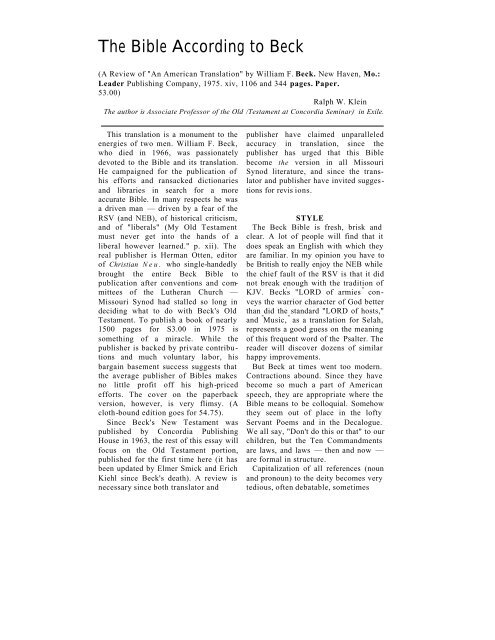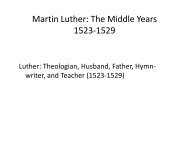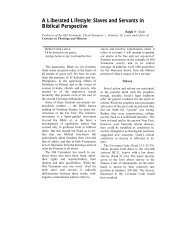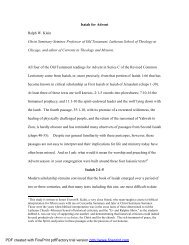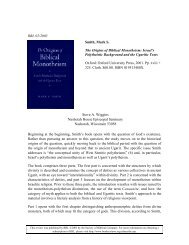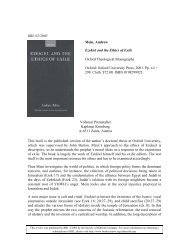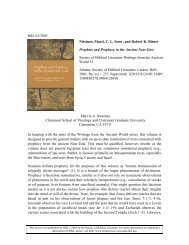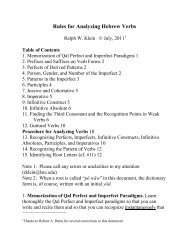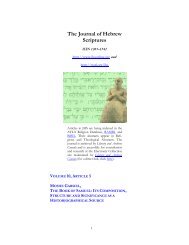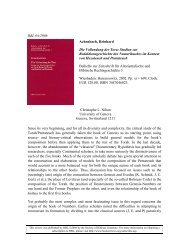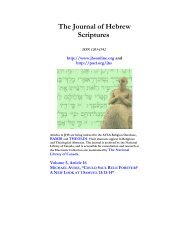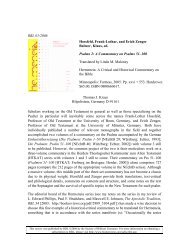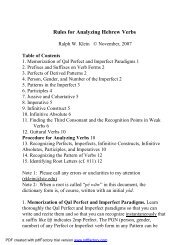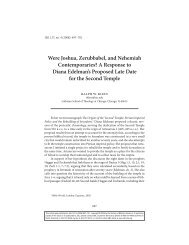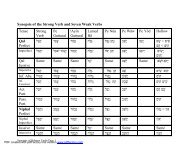The Bible According to Beck
The Bible According to Beck
The Bible According to Beck
You also want an ePaper? Increase the reach of your titles
YUMPU automatically turns print PDFs into web optimized ePapers that Google loves.
<strong>The</strong> <strong>Bible</strong> <strong>According</strong> <strong>to</strong> <strong>Beck</strong><br />
(A Review of "An American Translation" by William F. <strong>Beck</strong>. New Haven, Mo.:<br />
Leader Publishing Company, 1975. xiv, 1106 and 344 pages. Paper.<br />
53.00)<br />
Ralph W. Klein<br />
<strong>The</strong> author is Associate Professor of the Old /Testament at Concordia Seminar) . in Exile.<br />
This translation is a monument <strong>to</strong> the<br />
energies of two men. William F. <strong>Beck</strong>,<br />
who died in 1966, was passionately<br />
devoted <strong>to</strong> the <strong>Bible</strong> and its translation.<br />
He campaigned for the publication of<br />
his efforts and ransacked dictionaries<br />
and libraries in search for a more<br />
accurate <strong>Bible</strong>. In many respects he was<br />
a driven man — driven by a fear of the<br />
RSV (and NEB), of his<strong>to</strong>rical criticism,<br />
and of "liberals" (My Old Testament<br />
must never get in<strong>to</strong> the hands of a<br />
liberal however learned." p. xii). <strong>The</strong><br />
real publisher is Herman Otten, edi<strong>to</strong>r<br />
of Christian Neu. who single-handedly<br />
brought the entire <strong>Beck</strong> <strong>Bible</strong> <strong>to</strong><br />
publication after conventions and committees<br />
of the Lutheran Church —<br />
Missouri Synod had stalled so long in<br />
deciding what <strong>to</strong> do with <strong>Beck</strong>'s Old<br />
Testament. To publish a book of nearly<br />
1500 pages for S3.00 in 1975 is<br />
something of a miracle. While the<br />
publisher is backed by private contributions<br />
and much voluntary labor, his<br />
bargain basement success suggests that<br />
the average publisher of <strong>Bible</strong>s makes<br />
no little profit off his high-priced<br />
efforts. <strong>The</strong> cover on the paperback<br />
version, however, is very flimsy. (A<br />
cloth-bound edition goes for 54.75).<br />
Since <strong>Beck</strong>'s New Testament was<br />
published by Concordia Publishing<br />
House in 1963, the rest of this essay will<br />
focus on the Old Testament portion,<br />
published for the first time here (it has<br />
been updated by Elmer Smick and Erich<br />
Kiehl since <strong>Beck</strong>'s death). A review is<br />
necessary since both transla<strong>to</strong>r and<br />
publisher have claimed unparalleled<br />
accuracy in translation, since the<br />
publisher has urged that this <strong>Bible</strong><br />
become the version in all Missouri<br />
Synod literature, and since the transla<strong>to</strong>r<br />
and publisher have invited suggestions<br />
for revis ions.<br />
STYLE<br />
<strong>The</strong> <strong>Beck</strong> <strong>Bible</strong> is fresh, brisk and<br />
clear. A lot of people will find that it<br />
does speak an English with which they<br />
are familiar. In my opinion you have <strong>to</strong><br />
be British <strong>to</strong> really enjoy the NEB while<br />
the chief fault of the RSV is that it did<br />
not break enough with the tradition of<br />
KJV. <strong>Beck</strong> ' s "LORD of armies " conveys<br />
the warrior character of God better<br />
than did the standard "LORD of hosts,"<br />
and " Music, " as a translation for Selah,<br />
represents a good guess on the meaning<br />
of this frequent word of the Psalter. <strong>The</strong><br />
reader will discover dozens of similar<br />
happy improvements.<br />
But <strong>Beck</strong> at times went <strong>to</strong>o modern.<br />
Contractions abound. Since they have<br />
become so much a part of American<br />
speech, they are appropriate where the<br />
<strong>Bible</strong> means <strong>to</strong> be colloquial. Somehow<br />
they seem out of place in the lofty<br />
Servant Poems and in the Decalogue.<br />
We all say, "Don't do this or that" <strong>to</strong> our<br />
children, but the Ten Commandments<br />
are laws, and laws — then and now —<br />
are formal in structure.<br />
Capitalization of all references (noun<br />
and pronoun) <strong>to</strong> the deity becomes very<br />
tedious, often debatable, sometimes
mistaken. Style manuals tend <strong>to</strong> dis -<br />
courage it in current English usage, but<br />
it is questionable primarily because it<br />
often represents a desperate attempt <strong>to</strong><br />
identify Messianic predictions or Chalcedonian<br />
Chris<strong>to</strong>logy where the text<br />
will not lend its own support. <strong>The</strong><br />
"Prince" of Daniel 9:25 is usually held<br />
by <strong>to</strong>day's scholars <strong>to</strong> be either<br />
Zerubbabel or Joshua of early post<br />
exilic Jerusalem; the "Anointed" of<br />
Daniel 9:26 is a reference <strong>to</strong> the wicked<br />
Onias III, a high priest of the second<br />
century B.C., who was assassinated.<br />
<strong>Beck</strong>'s <strong>Bible</strong> forces both passages in<strong>to</strong><br />
the Messianic mold. It hardly seems<br />
likely either that the "Me" of Psalm<br />
16:10 is the divine Messiah since in<br />
verse 4 the speaker protests that he will<br />
not pour out drink offerings of blood<br />
for the gods. What would that mean on<br />
the lips of Jesus?<br />
<strong>Beck</strong> observes the rules of Hebrew<br />
parallelism quite well in poetic passages.<br />
<strong>The</strong>se rules were rediscovered by<br />
Robert Lowth in the 18th century,<br />
which explains why the KJV of 1611<br />
prints the poetic prophets as if they<br />
were prose. This failure in KJV <strong>to</strong><br />
detect the poetic character of much of<br />
the Old Testament, of course, makes it<br />
an obsolete translation <strong>to</strong>day. Unfortunately,<br />
although <strong>Beck</strong> prints the poems<br />
in Exodus 15, Deuteronomy 33, and in<br />
2 Samuel 22-23 in verse, he ignores the<br />
parallelism. Since 2 Samuel 22 and<br />
Psalm 18 are identical, it is most<br />
puzzling that parallelism is observed in<br />
the latter case only!<br />
Finally, any book published in 1975<br />
has <strong>to</strong> be tested for "sexist" language.<br />
Note the following: " Dinah ... went out<br />
<strong>to</strong> visit some of the local girls" (Gen.<br />
34:1); "how a man makes his way with a<br />
girl" (Prov. 30:19 — the Hebrew is<br />
almah!); "Grain will make the young<br />
flourish, and grape juice (should be<br />
"new wine") the girls" (Zech. 9:17). Cf.<br />
1 Cor. 7:28: "if a girl gets married."<br />
THE BIBLE ACCORDING TO BECK 105<br />
TEXTUAL CRITICISM<br />
<strong>Beck</strong> does make major additions<br />
fro m the Septuagint in 1 Sam. 10:1;<br />
13:15; 14:41; and 29:10 although he<br />
neglects <strong>to</strong> add a clause with equal<br />
attestation in 1 Sam. 4:1. Emendations<br />
are utilized elsewhere without notation;<br />
correctly in Psalm 18:15 and 73:4,<br />
doubtfully in Job. 19:26. But <strong>Beck</strong> can<br />
also be faulted for excessive caution. He<br />
should have emended "potter" <strong>to</strong><br />
"treasury " in Zech. 11:13 and "rich " <strong>to</strong><br />
"evil doers" or "demons" (the Hebrew<br />
is similar) in Is. 53:9. On textual matters<br />
<strong>Beck</strong> is perhaps equal <strong>to</strong> the standards<br />
of other English versions with the<br />
exception of the Roman Catholic New<br />
American Translation, which marked a<br />
significant advance, at least in certain<br />
books.<br />
INACCURACIES<br />
<strong>Beck</strong> was clearly a highly -skilled<br />
linguist so that most "inaccuracies"<br />
reflect debates about exegesis as much<br />
as anything else. But the following cases<br />
do reflect imprecision, inconsistency,<br />
or error:<br />
1) Psalm 18:47 "the God who lets<br />
me take vengeance. " This translation<br />
misses the divine monergism of the<br />
text. God gives deliverance <strong>to</strong> the<br />
psalmist; he does not merely permit<br />
the Psalmist <strong>to</strong> go on a rampage.<br />
2) Psalm 18:50 "You give Your<br />
king great vic<strong>to</strong>ries: You love Your<br />
anointed." <strong>The</strong> Hebrew has the<br />
pronoun "His " for<br />
cases.<br />
" "<br />
Your in both<br />
3) Psalm 67:3 May the people<br />
prais e You, 0 God, all the people<br />
praise You. Psalm 67:5 "<strong>The</strong> people<br />
should thank You, 0 God, all the<br />
people should thank you." Why the<br />
difference between "praise" and<br />
"thank" since the Hebrew is identical?<br />
Similarly the Hebrew expression<br />
usually translated "many waters"<br />
shows up as "great waters" in Psalm
106 THE BIBLE ACCORDING TO BECK<br />
77:19 and as "flood" in Psalm 18:16<br />
("great flood" in the parallel verse in<br />
2 Samuel 22).<br />
4) Psalm 77:9 "Has God forgotten <strong>to</strong> be<br />
kind ..?" "Kind" is much <strong>to</strong>o weak<br />
here and in Psalm 30:10. In Psalm<br />
67:1 <strong>Beck</strong> translates the same Hebrew<br />
word "be merciful."<br />
5) Psalm 79:9 "Because of your wonderful<br />
name rescue us; yes, forgive<br />
our sins for the honor of Your name."<br />
<strong>The</strong> translation "wonderful" hides the<br />
important technical term "glory "<br />
whereas<br />
" for the honor of' seems<br />
excessively paraphrastic. <strong>The</strong> Hebrew<br />
has only "for the sake of."<br />
6) Psalm 80:1 "0 One enthroned among<br />
the angels, shine!" Not only is<br />
"Cherubim" <strong>to</strong> be preferred <strong>to</strong><br />
"angels," but the imagery involved is<br />
of the LORD sitting enthroned<br />
invisibly on the ark's cherub throne,<br />
not of him presiding in his heavenly<br />
court.<br />
7) Psalm 133:1 "See how good and<br />
pleasant it is for brothers <strong>to</strong> live<br />
<strong>to</strong>gether!" <strong>Beck</strong> omits the important<br />
words "in unity;" cf. the omission of<br />
"<strong>The</strong>refore," which marks an important<br />
transition in Psalm 73:6.<br />
8) Daniel 9:25 "From the coming of the<br />
message <strong>to</strong> res<strong>to</strong>re and rebuild<br />
Jerusalem till the anointed Prince will<br />
be seven weeks and 62 weeks." <strong>The</strong><br />
text actually says that there will be<br />
seven weeks until the anointed prince<br />
comes <strong>to</strong> res<strong>to</strong>re Jerusalem, and then<br />
the city will exist for 62 weeks until<br />
it faces a new t ime of crisis.<br />
9) Zechariah 9:8 "I will camp in front of<br />
My people." Hebrew: "I will encamp<br />
in front of my house) = the temple)."<br />
DOCTRINAL BIAS<br />
Many of the places where <strong>Beck</strong><br />
mistranslates reflect doctrinal bias or a<br />
traditional exegesis imposed upon the<br />
text. Examples:<br />
1) Genesis 3:15 "And I will put<br />
enmity between you and the woman<br />
and between your descendants and<br />
her Descendant. He will crush your<br />
head, and you will bruise His heel."<br />
<strong>The</strong> capitalization of pronouns and<br />
the distinction between descendants<br />
and Descendant have no support in<br />
the Hebrew text. Some Christian<br />
tradition since the second century<br />
A.D. has taken this passage messianically,<br />
and this interpretation has often<br />
been a bellwether of "orthodoxy" in<br />
the Missouri Synod. Careful exegesis,<br />
however, shows that the text means<br />
only that sin has terrible<br />
consequences: people and wild<br />
animals are always in mortal combat<br />
as a result of our fall. <strong>The</strong> center<br />
margin of <strong>Beck</strong>'s <strong>Bible</strong> is used <strong>to</strong> list<br />
New Testament references <strong>to</strong> Old<br />
Testament passages. It correctly notes<br />
that there are no New Testament<br />
references <strong>to</strong> Genesis 3:15.<br />
2) Genesis 49:10 "<strong>The</strong> scepter will not<br />
pass from Judah ... till the Man of<br />
Peace comes." <strong>The</strong> translation puts<br />
orthodox Chris<strong>to</strong>logy on the lips of<br />
Jacob, but the deity of the Christ is<br />
something God chose <strong>to</strong> reveal only<br />
later. More importantly, the Hebrew<br />
has no reference <strong>to</strong> a "Man of Peace"<br />
at all; instead, it contains an enigmatic<br />
"Shiloh" which is frequently parsed<br />
as "gifts or tribute <strong>to</strong> him." If the<br />
latter is correct, translate: "<strong>The</strong><br />
scepter will not pass from Judah .. .<br />
till tribute comes <strong>to</strong> him." <strong>The</strong> author<br />
may have had in mind the economic<br />
success of the Davidic -Solomonic<br />
empire.<br />
3) Deut. 1:1 "This is what Moses said <strong>to</strong><br />
all Israel east of the Jordan." <strong>The</strong><br />
original says "on the other side of the<br />
Jordan," an expression possible only<br />
on the lips of a writer who lived west<br />
of the Jordan river. This passage — in
its correct translation — is often used<br />
<strong>to</strong> show that the Pentateuch itself<br />
does not claim Mosaic authorship.<br />
4) Psalm 3 and passim: A psalm by<br />
David. This translation of the frequent<br />
Psalm caption tries <strong>to</strong> decide<br />
the authorship question once and for<br />
all. But the Hebrew is much mo re<br />
ambiguous. Did it mean "by David,"<br />
"for David," or "belonging <strong>to</strong> a<br />
Davidic collection?" And even if it<br />
meant "by David," were these<br />
captions part of the original text?<br />
NEB and Today's English Version omit<br />
them completely. In the appendix <strong>to</strong><br />
the <strong>Bible</strong>, <strong>Beck</strong> seems <strong>to</strong> argue that<br />
Christ — not David! — was the<br />
author of Psalm 22. And what about<br />
Psalm 72? <strong>Beck</strong> renders: "About<br />
Solomon." Why not "By Solomon?"<br />
5) Psalm 2:12 "Kiss the Son." <strong>The</strong> word<br />
translated "Son" is Aramaic and not<br />
Hebrew. More likely, it is neither, but<br />
only an ancient textual error that<br />
happens <strong>to</strong> resemble an Aramaic<br />
word. Hence skip both the capitalization<br />
and the translation "son." <strong>The</strong><br />
RSV represents the best emendation<br />
<strong>to</strong> date: "kiss his feet."<br />
6) Psalm 8:5 " You make Him do without<br />
God for a little while." This passage<br />
in its original context has nothing <strong>to</strong><br />
do with the "state of humiliation" of<br />
Jesus. <strong>The</strong> writer was describing what<br />
fantastic honors and responsibilities<br />
God entrusted <strong>to</strong> men and women<br />
through creation. <strong>Beck</strong>'s "Him" and<br />
"a little while" ignore the context.<br />
Here is verse 4 in his translation and<br />
verse 5 in the correct RSV : "What is<br />
man that You should think of him, or<br />
a son of man that You should take<br />
care of him? Yet thou hast made him<br />
(= man) little less than God ...<br />
7) Prov. 8:22 "<strong>The</strong> Lord became My<br />
Father at the beginning of His way."<br />
This passage was unders<strong>to</strong>od Chris<strong>to</strong>logically<br />
at least as early as the Arian<br />
THE BIBLE ACCORDING TO BECK 107<br />
controversy. <strong>The</strong> RSV is superior:<br />
"<strong>The</strong> Lord created me (= wisdom) at<br />
the beginning of his work." Apparently<br />
<strong>Beck</strong> interpreted the passage as<br />
referring <strong>to</strong> Jesus instead of " personified<br />
wisdom." Since he could not<br />
square such a view of Jesus with the<br />
Nicene Creed (begotten, not made),<br />
the Biblical text had <strong>to</strong> yield. <strong>Beck</strong><br />
writes in the introduction: "Promotion<br />
of my translation will run up<br />
against special difficulties with my<br />
exact translation of the prophecies<br />
and every doctrinal passage. Modern<br />
ist powers use all their tricks and<br />
tyranny <strong>to</strong> oppose a Christ-centered<br />
<strong>Bible</strong>." (p. viii.) <strong>The</strong> real problem, we<br />
suspect, is that <strong>Beck</strong> did not think<br />
through the implications of Hebrews<br />
1: 1: "Long ago God spoke <strong>to</strong> our<br />
fathers in many different ways by the<br />
prophets. "<br />
8) Prov. 30:18-19 "Three things are <strong>to</strong>o<br />
wonderful for me and four things I<br />
can't understand: How an eagle makes<br />
his way through the sky, how a snake<br />
makes his way on a rock, how a ship<br />
makes its way in the middle of the<br />
sea, and how a man makes his way<br />
with a girl." We have already noted<br />
that "girl" is inappropriate here for<br />
stylistic reasons, but what is more<br />
as<strong>to</strong>nishing is that <strong>Beck</strong> did not<br />
translate the final word as "virgin"<br />
since he argued frequently that almah<br />
always meant "virgin" in the Hebrew<br />
<strong>Bible</strong>. This passage, of course, is the<br />
best evidence against that claim since<br />
the author is marvelling at four things<br />
in his world that leave him in awe: a<br />
bird's flight, a snake's meandering, a<br />
ship sliding through the waves — and<br />
a man and a woman making love!<br />
<strong>The</strong>re is no question that Matthew<br />
and Luke testify <strong>to</strong> the virginal<br />
conception, and that it has become<br />
part of orthodox Christian belief. <strong>The</strong><br />
question is: did Isaiah talk about a<br />
virgin's giving birth? Prov. 30:19
108 THE BIBLE ACCORDING TO BECK<br />
shows that philology makes no such<br />
demands. What would the context of<br />
Is. 7:14 indicate? Is verse 15 —<br />
especially in the <strong>Beck</strong> translation! —<br />
really a description of Jesus? "He will<br />
eat curds and honey before He (note<br />
capitalization) knows how <strong>to</strong> shun evil<br />
and choose good." Was there a time<br />
when Jesus did not know the<br />
difference between right and wrong?<br />
EDITING<br />
Given the size of the undertaking,<br />
matters of production and editing seem<br />
<strong>to</strong> have been handled with some<br />
competence. A reviewer cannot possibly<br />
read the whole text, but in the fairly<br />
large portions I read only three<br />
typographical errors cropped up: Psalm<br />
80:15 "strenthened" for strengthened;<br />
Prov. 8:22 "Lord" for LORD; and in Zech.<br />
10:12 the verse number is placed one<br />
sentence late. Footnotes are not handled<br />
well. <strong>The</strong>re is a footnote <strong>to</strong> the caption of<br />
Psalm 46 on p. 655, but the reader<br />
must turn <strong>to</strong> p. 628 <strong>to</strong> find out what the<br />
letter "i" means. <strong>The</strong> edi<strong>to</strong>rs should have<br />
eliminated the British spelling of<br />
"Saviour." Is "Old Being" in Daniel 7<br />
better than "Ancient of Days"?<br />
DAHOODIANISMS<br />
<strong>The</strong> discovery of the Ugaritic texts in<br />
1928 has led <strong>to</strong> great advances in<br />
Hebrew philology. Mitchell Dahood used<br />
these texts as a major resource for<br />
writing his three volume Anchor <strong>Bible</strong><br />
commentary (Psalms 1-50, 1966;<br />
Psalms 51-100, 1968; Psalms 101-150,<br />
1970). Dahood discovered hundreds and<br />
hundreds of new readings, and his<br />
creativity has been the marvel of<br />
comparative philology. <strong>The</strong> trouble is,<br />
Dahood is almost <strong>to</strong>tally innocent of self<br />
criticism, so that the majority of his<br />
suggestions must be rejected. From<br />
notes written on his deathbed, it<br />
appears that <strong>Beck</strong> used Dahood's work<br />
although it is difficult <strong>to</strong> tell whether it<br />
was only through his many articles or<br />
Volume 1 of his commentary. In any<br />
case, a number of Dahood's readings<br />
have been incorporated, many presumably<br />
by edi<strong>to</strong>rs Smick and Kiehl. <strong>The</strong><br />
Dahoodian readings which were discovered<br />
in my reading of the <strong>Beck</strong> <strong>Bible</strong><br />
are almost always untenable. <strong>The</strong> following<br />
are obviously only a sampling:<br />
1) Psalm 22:3 "But you are holy, on<br />
Your throne, You are praised by<br />
Israel." Better: "But you are holy,<br />
who sit enthroned on the praises of<br />
Israel."<br />
2) Psalm 22:20 "My precious life from<br />
the edge of the ax." <strong>The</strong> usual<br />
translation (. . . power of the dog)<br />
seems <strong>to</strong> refer back <strong>to</strong> the "dogs" in v.<br />
16.<br />
3) Psalm 22:25 "I praise You a hundred<br />
times ..." To praise a hundred times<br />
is a denominative verb invented by<br />
Dahood.<br />
4) Psalm 30:5 "His anger means destruction."<br />
Better: "His anger is only<br />
for a moment." Dahood's reading<br />
depends on interpreting the second<br />
half of the verse as a reference <strong>to</strong><br />
eternal life. At least <strong>Beck</strong> avoids the<br />
latter error.<br />
5) Psalm 30:11 "Change my weeping <strong>to</strong><br />
dancing." <strong>The</strong> imperative force stems<br />
from Dahood's interpretation of the<br />
perfect tense as precative, but the<br />
past tense (you have changed ...) is<br />
necessary <strong>to</strong> account for the change of<br />
mood in the Psalm, which ends with<br />
praise for past favors.<br />
6) Psalm 74:3 "Lift up Your people from<br />
these permanent ruins." <strong>The</strong> Psalm<br />
actually asks God <strong>to</strong> direct his steps<br />
<strong>to</strong> the permanent ruins. <strong>The</strong><br />
preposition in question can mean "<strong>to</strong>"<br />
or "from," but the Dahood neologism<br />
"Your people" results from the<br />
isolation of an emphatic conjunction<br />
pa. It is an unlikely conjecture.
7) Psalm 77:6 "At night I play the lyre."<br />
<strong>The</strong> Massoretic Text is very difficult<br />
here, but the usual emendation <strong>to</strong> "I<br />
commune" (at night in my heart)<br />
seems probable, especially in view of<br />
verse 12.<br />
8) Psalm 80:15 "Take care of what Your<br />
right hand planted." Instead of "take<br />
care," most versions have "the s<strong>to</strong>ck,"<br />
which is parallel <strong>to</strong> "the vine" in the<br />
previous verse.<br />
9) Psalm 89:1-2 "LORD, I will sing of<br />
Your love ... I will tell how Your<br />
love made the heavens, 0 Eternal<br />
One." <strong>The</strong> two uses of the possessive<br />
pronoun "Your" are not in the<br />
Hebrew text; Dahood claims that love<br />
in each case shares the suffix of a<br />
following noun. <strong>The</strong> divine epithet<br />
"Eternal One" is a mistaken interpre -<br />
tation of the adverb "forever."<br />
Dahood's commentaries swarm with<br />
such new epithets, and here, as often<br />
elsewhere, he ignores the necessary<br />
role played by the word in question<br />
in its conventional interpretation. <strong>The</strong><br />
balance of probability in these<br />
nine cases would seem <strong>to</strong> be against<br />
Dahood and <strong>Beck</strong>. It is surprising, <strong>to</strong><br />
say the least, that this "conservative<br />
<strong>Bible</strong>" adopts so many readings (I have<br />
only given a small sample) from so<br />
uncertain a source as Dahood.<br />
CONCLUSION<br />
Two accurate readings, finally, struck<br />
me as surprising because they present<br />
severe difficulties for <strong>Beck</strong>'s exegetical<br />
approach. <strong>The</strong> first of these is Ex. 6:3: "I<br />
appeared <strong>to</strong> Abraham, Isaac, and Jacob<br />
as God Almighty, but I didn't (does God<br />
really use contractions in oracles?)<br />
reveal Myself <strong>to</strong> them by My name `the<br />
LORD.' " This verse comes from the<br />
call narrative of Moses according <strong>to</strong> the<br />
Priestly Writer, and it stands in sharp<br />
tension with Gen. 4:26 and Gen. 15:1.<br />
<strong>The</strong> fact that the name LORD was used<br />
THE BIBLE ACCORDING TO BECK 109<br />
in the days of Enoch and Abraham<br />
according <strong>to</strong> these verses while such<br />
early use is explicitly denied in Ex. 6:3<br />
was and is one of the most telling pieces<br />
of evidence for the multiple authorship<br />
of the Pentateuch.<br />
<strong>The</strong> second surprising translation is<br />
Is. 40:3: "A voice is calling: 'Prepare a<br />
way in the wilderness for the LORD."<br />
<strong>Beck</strong>'s translation is right, but it also<br />
clearly eliminates this passage from the<br />
"messianic predictions." Instead of it<br />
referring <strong>to</strong> John the Baptist crying in<br />
the wilderness, this passage reports<br />
God's directions <strong>to</strong> his heavenly court<br />
<strong>to</strong> build a superhighway in the desert for<br />
bringing his exiles home from Babylon.<br />
Primarily a review of a new transla -<br />
tion should be expected <strong>to</strong> point out<br />
questionable renderings. I would be the<br />
last <strong>to</strong> deny that much rich <strong>Bible</strong> study is<br />
possible on the basis of this version. But<br />
those who consider using it for public<br />
worship or official sanction should be<br />
aware of its biases, its inaccuracies, its<br />
dependence, as in the case of Dahood,<br />
on unproven scholarship.


